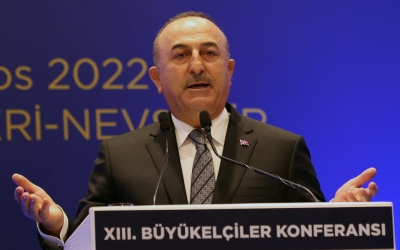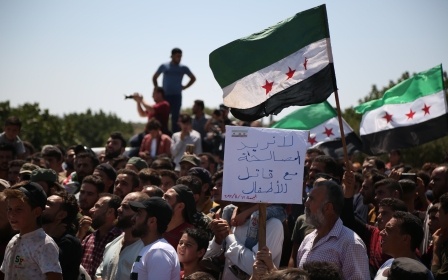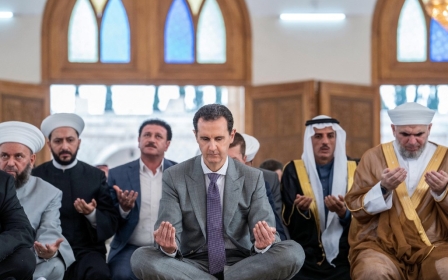Don't expect Turkey and Syria to normalise relations any time soon
Turkish Foreign Minister Mevlut Cavusoglu's revelation on Thursday that he met his Syrian counterpart after a decade of broken ties over Syria's civil war has surprised and angered many, including the rebel groups and civilians in opposition-held northern Syria.
But don't expect any diplomatic breakthrough between Ankara and Damascus any time soon, sources and experts told Middle East Eye.
Cavusoglu said he met Faisal Mekdad in Belgrade in October on the margins of the Non-Aligned Movement summit.
"There, too, I conveyed that the only solution for Syria was political reconciliation," he said.
"Terrorists should be cleared from Syria. On the other hand, I said that there should be peace between the Syrian opposition and the regime, and that we, as Turkey, can provide support in such a situation."
New MEE newsletter: Jerusalem Dispatch
Sign up to get the latest insights and analysis on Israel-Palestine, alongside Turkey Unpacked and other MEE newsletters
'I don't think anyone could find a middle ground and cut a deal right now. It would take a long time to bridge differences between them'
- Oytun Orhan, analyst
Cavusoglu was responding to a question asking whether there was a possibility of a phone call between Turkey's President Recep Tayyip Erdogan and Syria's Bashar al-Assad, which was alleged by a recent Turkish newspaper report with dubious sourcing.
Cavusoglu said that "right now" there were no diplomatic contacts between Ankara and Damascus.
Domestic pressure is growing on Ankara to warm relations with Damascus. The Turkish opposition's calls for a reconciliation between Turkey and Syria are increasing every day as the public grows increasingly hostile to the nearly four million Syrian refugees in the country.
A Turkish official said there was nothing new in Cavusoglu's statement, which referenced the political negotiations conducted through the Syrian government and the opposition in Geneva and later Nur-Sultan, formerly Astana, the capital of Kazakhstan.
"Turkey is already trying to establish peace through these formal mechanisms," the source said. "But the regime blocks progress, as they do at the committee that works on drafting a constitution."
Seeking common ground
In recent weeks, Erdogan has vocally supported the prospect of a fresh Turkish offensive on Syrian Kurdish fighters in northern Syria, specifically around the cities of Tal Rifaat and Manbij.
Last week, the Turkish president said his Russian counterpart, Vladimir Putin, proposed that Ankara work with the Syrian government to clear Kurdish YPG militants from those locations. But sources told MEE that Ankara doesn't believe that Damascus has neither the will nor the power to do so.
Oytun Orhan, a Middle East expert at the Ankara-based Centre for Middle Eastern Strategic Studies, says there are parties in both the Turkish and Syrian governments who are calling for normalisation and suggesting a deal could be cut over PKK-linked groups such as the YPG and the return of refugees.
"However, Syrian regime officials speaking to a local news agency this week made clear that their government wouldn't even meet with any Turkish officials until Turkey completely withdraws from northern Syria," Orhan said.
"I don't think anyone could find a middle ground and cut a deal right now. It would take a long time to bridge differences between them on the PKK and refugees."
Ongoing dialogue
The Syrian government became an international pariah when it violently cracked down on protests in 2011 and sparked a civil war that is continuing and believed to have cost half-a-million lives.
But in recent years, many Arab countries, most prominently the UAE, have resumed ties with Damascus. Several have been urging the Arab League to reinstate Syria, and meanwhile Washington has held direct talks with Syrian officials seeking compromises and the release of US journalist Austin Tice.
Crippled by a decade of war, harsh sanctions and a shocking economic crisis, Damascus is keen to re-engage, but many in Ankara find the Syrian government's conditions for talks, not only with Turkey but also with the US and the Arab League, unrealistic.
Despite Syria's insistence on major concessions for talks, both Cavusoglu and Erdogan have said discussions between the two countries are being conducted through their respective intelligence agencies.
Murat Yesiltas, a security expert at Ankara-based think-tank SETA, said Ankara has never used these intelligence dialogues to pursue normalisation.
"They directly talked to the Syrian muhkabarat [secret police] and discussed issues related to specific and tangible security files," Yesiltas told MEE. "I don't think there are any plans to change Turkey's Syria policy, but they still might be testing the waters."
Yesiltas said the Turkish government nevertheless needs to ease the domestic pressure it is facing over the issue of refugees, with less than a year until presidential and parliamentary elections in Turkey, but finding a solution isn't easy.
"It needs to be done through a deal with the regime, or you will evacuate more territories in Syria and allow more refugees to return to those areas," he said.
"But I don’t think Turkey can cut such a deal with the regime yet or anyone would want to return to regime-held territories."
Middle East Eye delivers independent and unrivalled coverage and analysis of the Middle East, North Africa and beyond. To learn more about republishing this content and the associated fees, please fill out this form. More about MEE can be found here.





